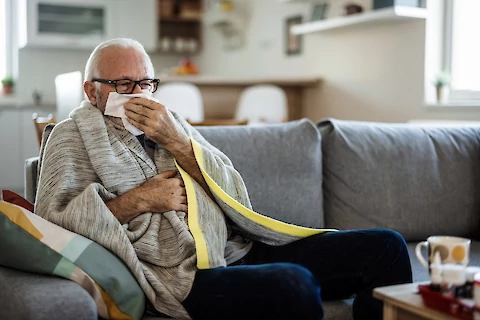
Seasonal Affective Disorder (SAD) is a type of depression that occurs during specific times of the year. This may particularly occur during the winter months. Many people assume that as spring rolls around, the symptoms of SAD will start to fade, allowing for happier and more energetic days. However, the arrival of spring can bring its own set of challenges for seniors suffering from Seasonal Affective Disorder, particularly when it comes to pollen and allergies.
In this blog post from Senior Helpers of Greater San Antonio, we will explore how environmental factors such as abrupt changes in pollen and allergy exposure can actually worsen the effects of Seasonal Affective Disorder in seniors and disrupt their daily routines.
The Link Between Pollen, Allergies, and Seasonal Affective Disorder in Seniors
As people age, they often become more susceptible to allergens, which can lead to increased discomfort during the spring months. Common allergic reactions, such as sneezing, itchy eyes, and congestion, can lead to feelings of fatigue, irritability, and general malaise, which are all symptoms associated with SAD.
Tips for Managing Pollen and Allergy-Related SAD Symptoms in Seniors
It's not possible to eliminate pollen and allergens entirely. However, there are several steps seniors and their caregivers can take to manage allergy-related Seasonal Affective Disorder symptoms:
- Monitor local pollen counts. Keep an eye on the pollen count in your area and try to avoid outdoor activities when counts are high. This can help reduce exposure to allergens and alleviate allergy-induced SAD symptoms.
- Use air purifiers and keep windows closed. Using air purifiers in your home can help to filter out pollen and other allergens. Keeping windows closed can also prevent them from entering a senior's living space.
- Consult with a healthcare professional. Talk to a doctor or allergist about appropriate allergy medications and treatments that may help alleviate the symptoms. They can also provide guidance on managing SAD symptoms throughout the year.
- Maintain a regular sleep schedule and engage in light therapy. Sleep plays a crucial role in regulating mood and energy levels. Sticking to a consistent sleep schedule and using light therapy, which involves exposure to a bright light that simulates sunlight, can help combat SAD symptoms.
Resources Available for Seniors with Pollen and Allergy-Related SAD
Seniors who are struggling with seasonal allergies or SAD should reach out to their doctor or medical care team. A doctor can offer management suggestions and medications that can help to control the effects of seasonal allergies.
Senior Helpers Offers Support and Encouragement
It's important to recognize that seasonal allergies can significantly impact the severity of Seasonal Affective Disorder symptoms in seniors. By understanding this connection and taking proactive steps to manage pollen and allergy exposure, seniors and their caregivers can help to alleviate some of the burdens that accompany this challenging time of year.
If you or a loved one in the San Antonio, Helotes, Alamo Heights, Kerrville, Castroville, Converse, Floresville, La Vernia, Von Ormy, or Poteet area are experiencing pollen and allergy-related SAD symptoms, Senior Helpers of Greater San Antonio can provide support and assistance. Our team can help seniors maintain their well-being and enjoy a more comfortable and fulfilling life, no matter the season. Contact us today to know more about our in-home care services.